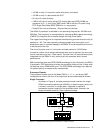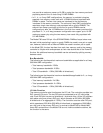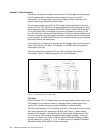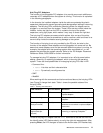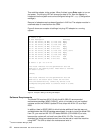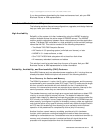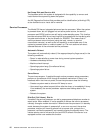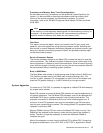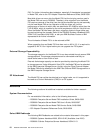16 RS/6000 7025 Model F80 Technical Overview
Hot Swap Disk and Service Aid
The hardware within the system is designed with the capability to remove and
install disks without powering down the system.
An AIX Diagnostics Service Aids provides positive identification (a blinking LED)
at the disk device as a visual aid for removal.
Service Processor
The Model F80 has an integrated enhanced service processor. When the system
is powered down, but still plugged into an active power source, the service
processor and SPCN functions are still active under standby power. This function
provides enhanced RAS by not requiring AIX to be operational for interfacing with
a system administrator or service director for RS/6000. This means that all
service processor menu functions (using the local, remote, or terminal
concentrator console), as well as dial out capability, are available even if the
system is powered down or unable to power up. The next sections talk about
selected features of the enhanced service processor.
Automatic Reboot
The system will automatically reboot (if the appropriate policy flags are set) in the
following conditions:
• Power is restored after a power loss during normal system operation.
• Hardware checkstop failures.
• Machine check interrupt.
• Operating system hang (Surveillance failure).
• Operating system failure.
Surveillance
The service processor, if enabled through service processor setup parameters,
performs a surveillance of AIX through a heartbeat mechanism. If there is no
heartbeat within the time-out period, the service processor does the following:
• Creates a system reset to allow an AIX dump to occur.
• Upon receiving a reboot request (either after the dump, or immediately if dump
is not enabled), the service processor captures scan debug data for the
system.
• Reboots the system.
Dial-Out (Call Home), Dial-In
If enabled, the service processor can dial a preprogrammed telephone number to
report errors. When enabled, it is also possible to access the service processor
remotely through a modem connection. When the service processor is in standby
mode, because the system is powered off, or an error occurred, the service
processor monitors an incoming phone line to answer calls, prompts for a
password, verifies the password, and remotely display the standby menu. The
remote session can be mirrored on the local ASCII console if the server is so
equipped and the user enables this function.



